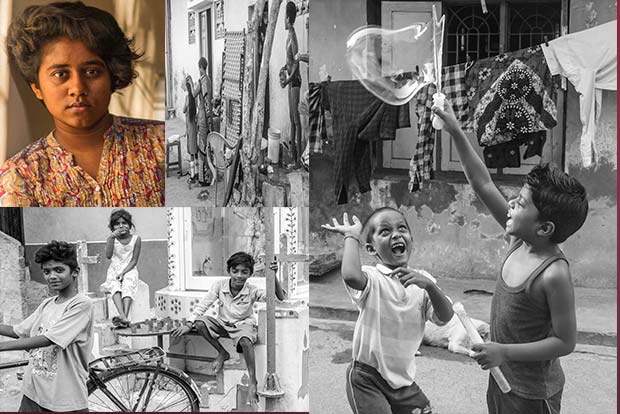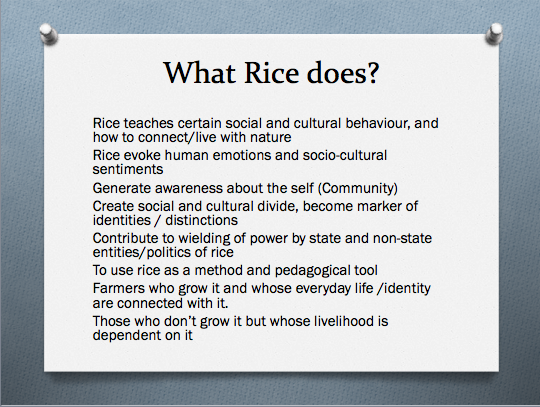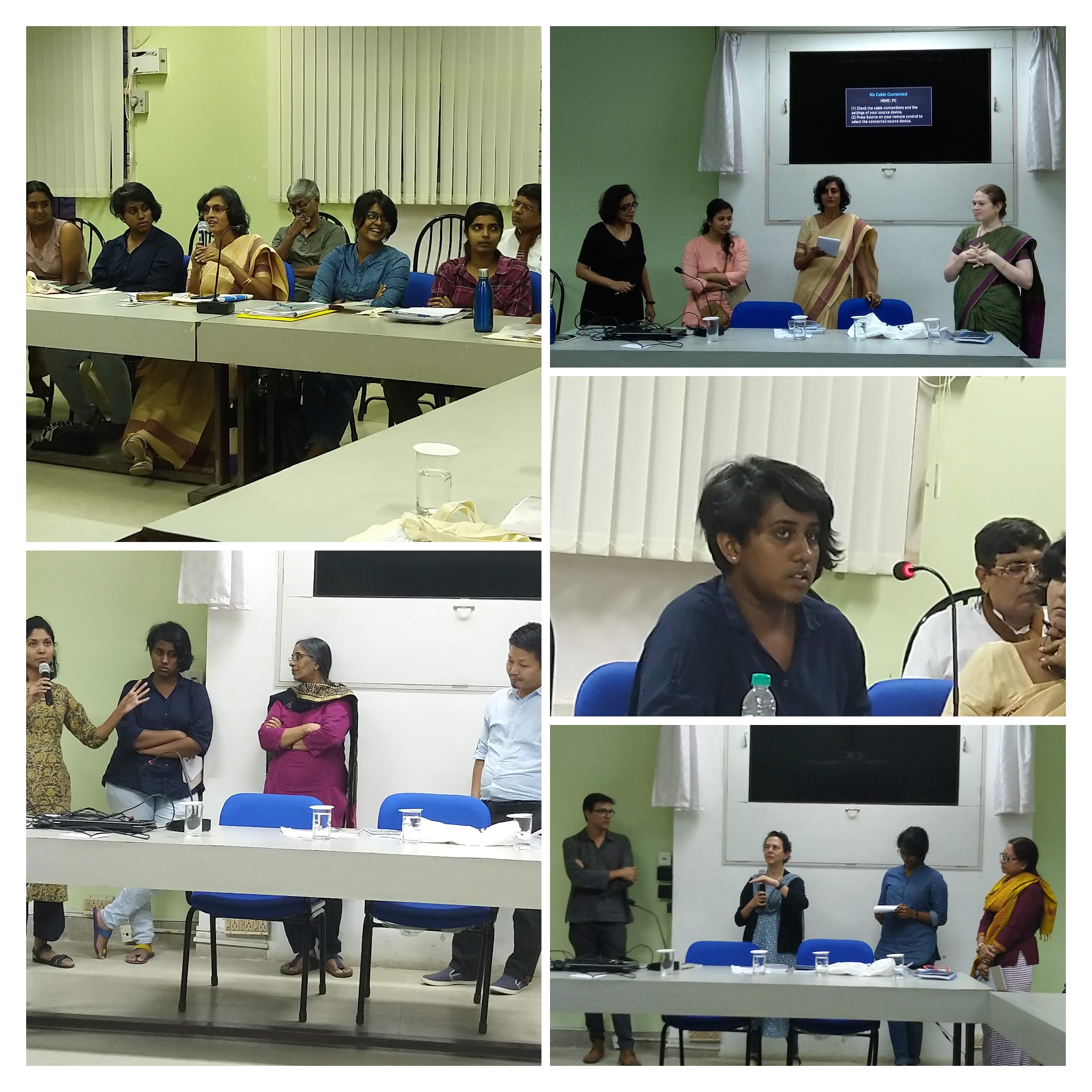Blog

- Report
Day 1 of Storytelling & Writing Workshop, Chennai
“… how do you express yourself in stories when you’re writing down… this is something I’m beginning to see after this workshop…how to put my thoughts together… how to bring and access information…how to use it and prioritise it in a meaningful way to make it impactful...”
- Dharitri Narzary, Assistant Professor, Ambedkar University Delhi
Introduction
The Storytelling and Writing Workshop was organised for three days between 19 -21 December in the Auditorium of Madras Institute of Development Studies. Collaboration of HaB-MIDS-Kenyon College, this workshop for many of us, the participants, was a unique experience. The three conveners – Aarti Kawlra (HaB), Wendy Singer (Kenyon College) and Anandhi S. (MIDS) led us through the process of understanding what is storytelling and how does one tell stories.
We were a combination of participants – PhD students, researchers, independent scholars and professionals. Like the process of writing stories – starting with generating a narrative of tension leading to a climax and finally resolution of the tension, the Workshop was a space where each one of us experienced something surprising about our own abilities to write and connect as well as it gave us an opportunity to see our friends from a different lens.
Session I: Sharing and finding common ground
The first day, 19 December, started with an introductory session where some of the participants shared their current work through presentations. Yazhini, a student, street photographer and a theatre activist, spoke about her first exhibition - Ambedkar Nagar, near Kakan Bridge, Chennai. The residential area is largely inhabited by dalits[1] and also people from the northeast India. In course of the workshop, we engaged with her photographs, which were displayed in the auditorium and the issue of caste. Yazhini connnected her experience of documenting this exhibition and lives of the residents of Ambedkar Nagar to talk about 'Development' in the session on using the peadogogy of word-concepts to create stories in a meaningful way.

Yazhini A.: Exhibition: Ambedkar Nagar- near Kakkan Bridge, Chennai (6-12 December 2019)
The team from Ambedkar University Delhi – Vinitha Jayaprakasan, Mesha Murali, Kumar Unnayan, Dharitri Narzary, Surajit Sarkar and Michael Lunminthang shared how by drawing from communities’ oral histories and narrative as well as everyday practices, their projects bring to fore people’s lives, their histories, and their stories which get lost in the jumble of and dependence on academic jargon.
Surajit through his presentation on ‘The practice of everyday life’ shared how “local knowledge is characterised as context bound, community specific and non-systematic because it is generated from the ground up through social practice in everyday life”. He also shared how he brings the pedagogy of orality in the classroom through assignments like (a) an assignment on games played at 7,14 and 21 – and answers from three generations at home or (b) what was it like on the day PM Indira Gandhi was assassinated – stories from father who returned home after a day and a half
Dharitri started her presentation ‘Rice as critical pedagogy’ with a song that adults often sang to the children in Kokrajhar (https://humanitiesacrossborders.org/repository/rice-play-song-1). The song immediately struck a cord among the participants as some of them too had similar songs in their own culture. The presentation was a window into how rice can be used to decolonise the discussions around rice.

Nicolas Bautès from French Institute of Pondicherry introduced his work in Brazilian favela through frozen frames of a contested square taken in different years – 2005, 2011, 2013 and 2016. Each presentation was a window into the different ways in which we can use words, images and sounds to understand the world and people.
Session II: Using 'word-concepts' as pedagogical tool
As we followed through the discussions on our works and neared the lunchtime, it was evident that each one of us was using storytelling in different ways. As presentations have a way of making people wonder on account of information overload, some of us were already trying to grapple where we were going with the workshop. What was it that we were hoping to accomplish or process? Then post-lunch, the tenor of the workshop changed.
We were divided into four thematic groups of ‘citizenship,’ ‘development,’ ‘sustainability’ and ‘tradition’. Aarti Kawlra, Anandhi S., Uma Vangal and Wendy Singer led the four thematic groups respectively. We had to explore the different usages - everyday, common sense, popular, and expert of our assigned word-concepts.
We started on an uncertain ground… how…what… but as each one spoke about their experience related with the word-concepts, many stories emerged.
Uma, Suriya, Cheryl and Vinitha reflected the word 'Sustainability' differently. The conversation began with Suriya's take on law and 'sustainability'. I pointed out how the word 'sustainability' reflects my struggle with sustaining self in a city 'every day'- navigating work and negotiating job/interest/passion. Vinitha recalled how she was introduced with the word 'sustainable development' as a kid in school, and the conversation went to the gap between policymakers and the common people while implementing environment related and other laws. Through Uma the conversation explored women's everyday struggle in sustaining a dialogue against patriarchy via examples of serials, media portrayal, social movements, etc as well as assertion of identity during these movements. The conversation also went on to reflect how in order to 'sustain', and continue a movement; one must build allies, form solidarity and sisterhood, etc. Some of the examples that came up during these discussions were- #prayformasamani, pinjratod's, etc.

Discussing the word-concepts
Vinitha ended the above description on our group’s discussion on word-concepts- sustainability thus, “I believe our discussion converging to women's everyday struggles while brainstorming the word 'sustainability' is a reflection of us being the only team consisting of all women- which was a stimulating realisation”.
Through tradition, the group comprising Wendy, Dharitri, Surajit, Nicolas and Simi, thoughts of how it is used to reinforce notions of patriarchy and also to reinforce a series of activities and rituals, which if unknown, can become tools of exclusion and yet it is mobile and changes over time emerged. Tradition is also about familiarity – of ways in which familiar objects like Amul butter can become a link to identity in different spaces or traditions of institutes or its values and meanings. Dharitri shared, "the discussion managed to break the idea /perception of tradition as 'frozen' in time and antithesis to being progressive. The examples can be the diasporic groups who practice 'tradition' as a symbolic gesture to stay connected with the roots and use it as a means to carry forward the 'value(s)' embedded in it. But the practice itself need not remain exactly the same and it is the meaning which becomes important".
Yazhini, Mesha, Michael and Anadhani focsuing on 'Development' started by discussing the narrative of development presented by the media - here in the context of Yazhini's fieldwork in Ambedkar Nagar. It was discussed how media projects the 'problem' of development as the problem of the people, how the onus of being developed or well off is left as a responsibility of the people; and in turn discounts the civil authorities of their responsibility. The group then spoke about art and development – the ways classical artists, especially those who practiced Carnatic music, associate development with performing at a Carnatic concert.
In the final 10 minutes when the group realised that it was maybe looking at the concept of development in a very unidirectional manner, it then tried to discuss what could be the other ways in which development can be understood. They then spoke about language as development - people considering fluency in English as a sign of being more developed, and women's mobility or how in different socio-economic situations women’s mobility can be understood as synonymous to being developed or not developed.
Unnyan, who was part of the 'Citizenship' group along with Aarti, Bharathidasan, Brinda, and Sriniti described the process thus, “ [o]ur group had five participants who were asked to present on the word 'Citizenship' as a concept. In order to contextualise our diverse understandings of the very word, we started with noting down different terms in our respective vernacular languages for the concept of Citizenship. Bringing the Hindi, Malayalam, Tamil and English words together, the group discussed the socio-political connotations that each word carries. This fostered a sense of multiplicity that is inherent to the very idea of citizenship and encouraged us to locate this multiplicity in the backdrop of the National Register of Citizenship (NRC) and Citizenship Amendment Bill (CAB), as proposed by the Government of India. Following a 2-minutes skit on the same, the group discussed the complexities of labeling the citizens of a country, the biased understandings about refugee communities and how diverse places carry multiple geopolitical meanings of one concept.
For the skit on Citizenship, click https://www.youtube.com/watch?v=YU6NysF1rpI&feature=youtu.be (Note: a description on the link has to be added)

The exercise of using word-concepts helped 'unpack' a dominant term/metaconcept/meta-term; and bring forth narratives from multiple perspectives in plain-speaking, an essential component of storytelling and writing. It highlighted the different meanings that we assign to or associate with a word, for which one is perhaps expected to have a common understanding. Exploring a word or a concept from different languages adds additional layers. As a pedagogical tool, breaking down a word/concept is not only a decolonising tool but also a meaningful storytelling trope. Reflecting on this exercise Uma shared, "this was an eye opener and paved the way for beginnings of dialogues...explore the way words could impact our understanding of the world; our goals and philosophies. The session threw up a lot of food for thought on how to relate it to our own selves, our work and our ethical positions."
The first day ended with a pleasant short walk to the dinner venue, Crimson Chakra, where we had an elaborate taste of South Indian cuisine. The first day left us thinking about how the big words that we frequently use in universities, papers, newspapers, and as jargons are riddled with human stories (that are often left hidden) and have multiple meanings. By breaking the big words we could glimpse how stories ... real stories, can be written.

[1] The term dalit means 'oppressed', 'broken' or 'crushed' and was adopted by members of this group in the 1930s. The term has come to symbolise a movement for change and eradication of centuries-old oppression under Hindu caste system where they were/are considered at the lowest level .
- Log in to post comments


